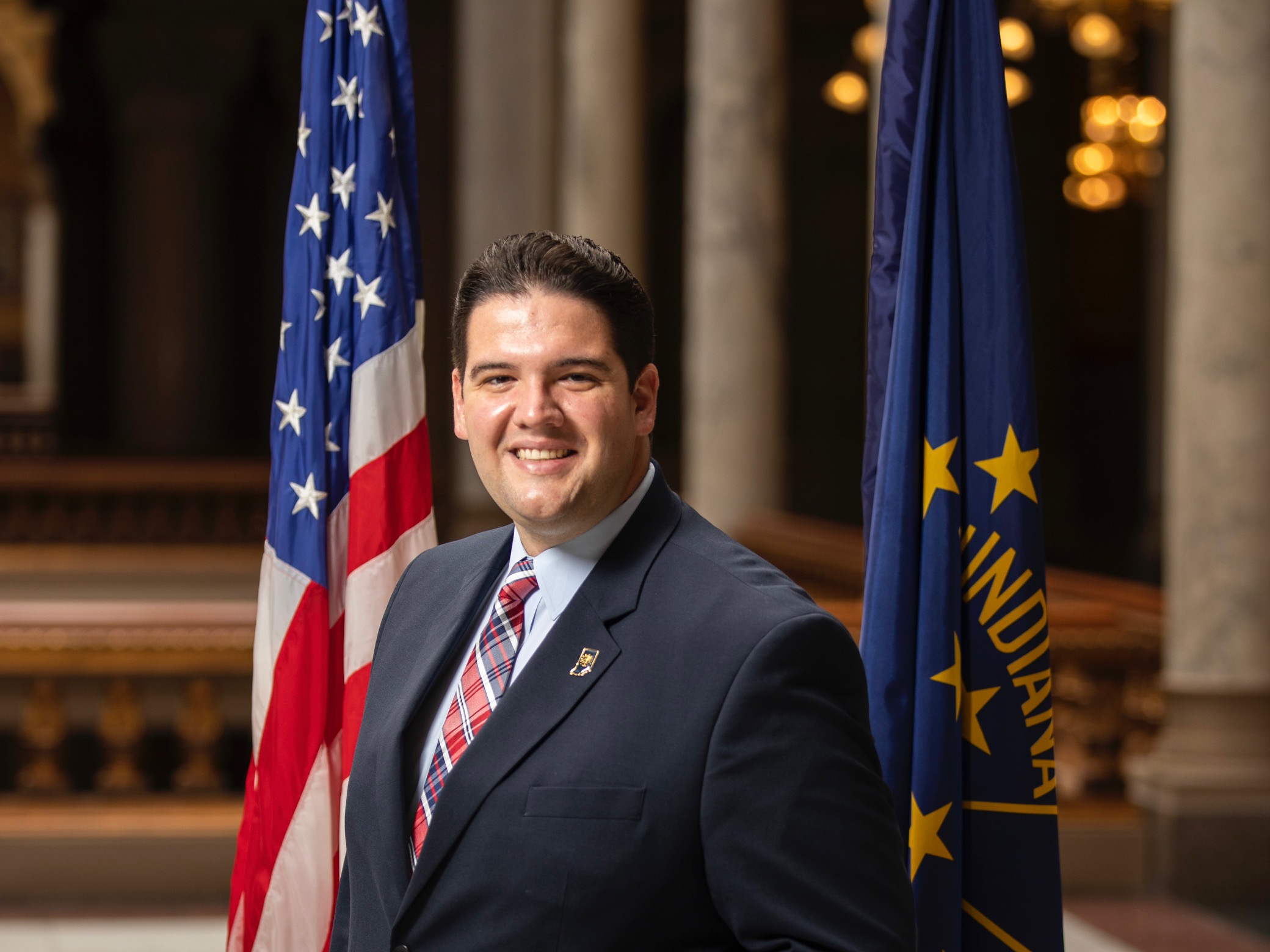Gov. Holcomb Announces New Executive Director For The Office of Energy Development
INDIANAPOLIS – Gov. Eric J. Holcomb today announced that Ryan Hadley is the new executive director for the Indiana Office of Energy Development.
“Ryan Hadley is committed to finding affordable and stable energy for all Hoosiers,†Gov. Holcomb said. “He is driven to continuously improve our state’s energy economy by finding reliable and innovative solutions.â€
Hadley most recently served as the executive director of external affairs for the Indiana Utility Regulatory Commission (IURC) where he oversaw the agency’s legislative, media, and stakeholder management strategies, as well as the Consumer Affairs Division. He will continue to provide legislative assistance to the IURC through the conclusion of the current General Assembly session. Prior to that position, he worked as the deputy director of legislative and external affairs for the agency.
“I want to thank Governor Holcomb for the opportunity to serve in this role,†Hadley said. “I look forward to helping Indiana navigate the changing and evolving energy landscape and continue Indiana’s strong legacy of safe, reliable, and affordable energy services that are essential for Hoosiers.â€
Hadley earned an undergraduate degree from University of Southern Indiana. Hadley begins his tenure on Jan. 24.
In Indiana, the Office of Energy Development was established to shepherd energy planning and policy development. OED focuses on the development and implementation of comprehensive energy planning for the state that utilizes all of Indiana’s energy resources and supports a strong, dynamic and growing economy.
National Endowment for the Arts Supports the Arts in Indiana with $254,000 in Awards in First Round of FY2022 Funding
(Indianapolis, Indiana) Last week, the National Endowment for the Arts (NEA) announced the awarding of 15 grants totaling $254,000 to Indiana nonprofit arts organizations and cultural programming providers during the first round of grants for fiscal year 2022. Â
“These National Endowment for the Arts (NEA) grants underscore the resilience of our nation’s artists and arts organizations, will support efforts to provide access to the arts, and rebuild the creative economy,†said NEA Acting Chair Ann Eilers. “The supported projects demonstrate how the arts are a source of strength and well-being for communities and individuals, and can open doors to conversations that address complex issues of our time.â€
Indiana grant recipients include:
American Cello Institute, Inc., Bloomington, INÂ
Grants for Arts Projects – Music ($10,000)Â
Lotus Education and Arts Foundation, Inc., Bloomington, IN
Grants for Arts Projects – Presenting & Multidisciplinary Works ($25,000)Â
Arts United of Greater Fort Wayne, Inc., Fort Wayne, INÂ
Grants for Arts Projects – Folk & Traditional Arts ($10,000)Â
Audiences Unlimited, Inc., Fort Wayne, INÂ
Challenge America ($10,000)Â
Decay Devils, Incorporated, Gary, INÂ
Challenge America ($10,000)Â
Eiteljorg Museum of American Indian and Western Art, Inc., Indianapolis, INÂ
Grants for Arts Projects – Folk & Traditional Arts ($15,000)Â
Groundwork Indy Inc, Indianapolis, INÂ
Challenge America ($10,000)Â
Harrison Center for the Arts, Indianapolis, INÂ
Grants for Arts Projects – Artist Communities ($19,000)Â
Heartland Film, Inc., Indianapolis, INÂ
Grants for Arts Projects – Media Arts ($20,000)Â
Indianapolis Symphony Orchestra, Indianapolis, INÂ
Grants for Arts Projects – Music ($20,000)Â
Indianapolis Art Center, Indianapolis, INÂ
Grants for Arts Projects – Visual Arts ($20,000)Â
Percussive Arts Society, Indianapolis, INÂ
Grants for Arts Projects – Music ($10,000)Â
Muncie Arts and Culture Council Inc, Muncie, INÂ
Grants for Arts Projects – Local Arts Agencies ($30,000)Â
Arts Alliance of Southern Indiana (AASI), New Albany, IN
Grants for Arts Projects – Local Arts Agencies ($10,000)Â
Art Spaces, Inc., Terre Haute, INÂ
Grants for Arts Projects – Visual Arts ($35,000)
The Grants for Arts Projects program supports public engagement with, and access to, various forms of art across the nation, the creation of art, learning in the arts at all stages of life, and the integration of the arts into the fabric of community life. The next Grants for Arts Projects application deadlines are Thursday, February 10, 2022, and Thursday, July 7, 2022.Â
Challenge America grants offer support primarily to small and mid-sized organizations for projects that extend the reach of the arts to populations that have limited access to the arts due to geography, ethnicity, economics, or disability. The next Challenge America application deadline is Thursday, April 21, 2022.Â
Visit arts.gov/grants to learn more about these opportunities and the other funding opportunities offered by the NEA. Â
O’Brien’s Bill Ensuring Public Comment At School Board Meetings Clears House Committee
STATEHOUSE (Jan. 19, 2022) – The House Government and Regulatory Reform Committee voted unanimously today to advance legislation authored by State Rep. Tim O’Brien (R-Evansville) to require time for public comment at school board meetings.
O’Brien said House Bill 1130, which now goes to the full House for consideration, would ensure Hoosiers’ voices are heard. While not an issue in the district he represents, O’Brien said this is a growing concern as school boards across Indiana recently shut down any public comment time.
“Hoosiers deserve to have a say in their children’s education and school boards should always listen to all stakeholders,” O’Brien said. “Increased collaboration between elected officials, parents and the community will mean better outcomes for students.”
O’Brien’s bill would require school boards to allow for oral testimony from members of the public physically present at a meeting. He said school boards could set time limits and take reasonable steps to maintain order in meetings, like removing a disruptive person.
To learn more and watch legislative proceedings, visit iga.in.gov.
GOVERNOR’S PUBLIC HEALTH COMMISSION TO MEET VIRTUALLY JAN. 20
GOVERNOR’S PUBLIC HEALTH COMMISSION TO MEET VIRTUALLY JAN. 20
|
Committee Advances McNamara’s Juvenile Justice Bill
STATEHOUSE (Jan. 19, 2022) – The House Courts and Criminal Code Committee voted unanimously today to advance legislation authored by State Rep. Wendy McNamara (R-Evansville) to reduce recidivism rates among nonviolent youth offenders.
According to a 2021 Indiana Youth Institute report, Indiana ranks seventh-highest in the nation for the number of youth per capita in the juvenile justice system. Nearly a third of juvenile offenders will be arrested for another crime within three years, according to the report.
“Juvenile offenders – some as young as six years old – are sometimes detained for long periods of time for minor offenses, like truancy,” McNamara said. “A new risk and needs assessment tool would help judges determine which offenders pose a risk to the community, while better identifying needed social services and mental health resources. This will help keep our communities safe while reducing a child’s risk of returning to the criminal justice system.”
McNamara, chair of the committee, said her legislation would help nonviolent youth offenders receive counseling for mental health and behavioral issues rather than being incarcerated or placed in detention. A Council of State Governments report shows youth who participate in diversion programs or counseling are 40% less likely to reoffend.
If passed into law, juvenile offenders would be screened and evaluated to see if they pose a danger to the community. Children younger than 12 years old would not be detained unless it is essential for a community’s safety and no reasonable alternative exists. Judges would still have discretion when deciding if an offender presents a flight risk or danger.
McNamara said juvenile offenders often face mental health and substance abuse issues, abandonment, homelessness and trauma. According to the IYI report, 70 percent of all juvenile offenders suffer from some kind of mental illness and children who experience abuse and neglect are 55% more likely to be arrested and 96% more likely to commit a violent crime.
A new juvenile justice oversight body, established by this legislation, would create the screening tool for young offenders and develop a statewide grant program to support juvenile justice initiatives focused on pre-trial diversion and behavioral health needs. A CSG report shows that for every dollar spent on juvenile diversion programs, it saves $11 in taxpayer money spent on incarcerating youth.
House Bill 1359 now moves to the full House for consideration.
 EVPL Partnering With AARP To Provide Tax AideÂ
Evansville, IN, January 18, 2022 – The Evansville Vanderburgh Public Library is once again partnering with AARP to provide tax aide sessions.Â
Appointments are now available. Call or visit any EVPL location to schedule an appointment at one of the participating locations:Â
 • EVPL RED BANK: 812.428.8205Â
• EVPL Central: 812.428.8200Â
• EVPL McCollough: 812.428.8236Â
• EVPL Oaklyn: 812.428.8234Â
• EVPL North Park: 812.428.8237Â
Make sure you have your picture ID and all of your tax documents with you. AARP has a list of documents they recommend you bring.Â
 The Evansville Vanderburgh Public Library has served our community for more than a century. With eight locations throughout Vanderburgh County, immediate access to hundreds of thousands of digital resources, and a dedicated team of library prÂ
EPA Announces New WIFIA Loans Totaling $688 Million, Highlights More than $5 Billion in Water Infrastructure Investments Towards Building a Better America
WASHINGTON (Jan. 19, 2022) – Today the U.S. Environmental Protection Agency (EPA) announced new Water Infrastructure Finance and Innovation Act (WIFIA) loans totaling $688 million to help finance water infrastructure projects in Baltimore, Md.; Milwaukee, Wis.; and the San Francisco Bay area. In the first year of the Biden-Harris administration, EPA closed 29 WIFIA loans that are investing over $5 billion in communities across the country to protect public health and the environment while creating over 36,000 jobs.
“In my first year as EPA Administrator, I have visited communities from coast to coast. I’ve seen aging infrastructure that communities count on for clean and safe water. I’ve seen the harm that is caused when water systems fail, and I’ve seen the revitalization that comes with new investment,†said EPA Administrator Michael S. Regan. “Investing in water infrastructure strengthens the health of our communities while creating good paying jobs. This is a fundamental way that EPA is Building a Better America under President Biden’s leadership, and its why we’re so excited to put more than $50 billion to work in water infrastructure through the Bipartisan Infrastructure Law.â€
In a speech to the U.S. Conference of Mayors on Wednesday morning, Administrator Regan announced new WIFIA loans that together will create more than 4,000 jobs, while emphasizing the promise of President Biden’s commitment to Building a Better America.
Baltimore, Md.
EPA’s WIFIA financing totaling $396 million will help the City of Baltimore proactively implement projects to improve the reliability and resiliency of its water systems, including by replacing water mains ahead of schedule. Through WIFIA, the city will save approximately $100 million while project construction and operation are expected to create an estimated 2,700 jobs.
Union Sanitary District, Calif.
EPA’s $250 million WIFIA loan to Union Sanitary District in California will help fund upgrades to aging water infrastructure to improve wastewater treatment, reduce nutrient discharges to the San Francisco Bay, and increase resiliency to the impacts of climate change. Project construction and operation are expected to create 1,630 jobs.
Milwaukee, Wis.
EPA’s $42 million WIFIA loan will help the Milwaukee Metropolitan Sewerage District expand its stormwater management capacity and reduce flood risk in historically underserved communities. Project construction and operation are expected to create an estimated 130 jobs.
The public health, environmental, and economic benefits of these projects are illustrative of what many more communities will see under the Bipartisan Infrastructure Law. EPA is receiving more than $50 billion to improve our nation’s drinking water, wastewater, and stormwater infrastructure – the single largest investment in water that the federal government has ever made. In 2022, EPA is providing $7.4 billion through the law to the State Revolving Funds, with more to come in the next five years. In December, Administrator Regan sent a letter to Governors of every state and territory, calling for resources to be targeted to overburdened communities, to make rapid progress on lead-free water for all, and to tackle forever chemicals.






